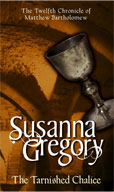 The Twelfth Chronicle of Matthew Bartholomew
The Twelfth Chronicle of Matthew Bartholomew
In the bitter winter of 1356 Matthew Bartholomew and his book-bearer Cynric accompany Brother Michael to Lincoln, so that Michael can be installed as a cathedral canon. Bartholomew is also on a personal quest, continuing his search for the beautiful Matilde.
The Michaelhouse men find Lincoln an unholy place, riven by discord, with a Bishop seemingly unable to control the wild behaviour of his cathedral clergy, and with a sheriff happily accepting bribes to give him, if not Lincoln’s citizens, a peaceful life. They also find murder, and the reappearance of a holy relic that had been stolen more than twenty years earlier.
Against their will, the Cambridge scholars are drawn into investigating the unnatural deaths, and the circumstances surrounding the provenance of the so-called Hugh Chalice, endangering both their lives and their souls as they are caught up in the maelstrom of corruption that courses through the ancient city. And through it all, Bartholomew continues his desperate hunt for the elusive Matilde …
Amazon.co.ukHardcoverKindle EditionWaterstoneseBook
Amazon.comUS HardcoverUS Kindle Edition
The Tarnished Chalice is also available in audio format, read by Andrew Wincott. It can be ordered from Amazon.co.uk as an audio CD or downloaded from Amazon.com or iTunes.
Extract
Lincoln, December 1356
The Gilbertine Priory of St Katherine occupied a substantial tract of land about a mile south of the city, tucked between the main road and the broad River Witham. Like many convents that had been built outside the town defences, it had looked to its own security, and was protected by a high wall. Unfortunately, the wall was in a poor state of repair, suggesting it had been built in a time of plenty but the priory within was currently experiencing leaner times.
The gatehouse was similarly affected: there was worm in its wooden door and its metal bosses were rusty. The grille that allowed guards to scan visitors before opening the front door was missing, affording anyone outside an unobstructed view of the buildings within. Bartholomew saw several long, tiled roofs, indicating that the Gilbertines owned a sizeable institution, if not a wealthy one.
Opposite the gate, standing so close to the side of the road that carts would surely be obliged to alter course to avoid it, was a tall structure, liberally adorned with pinnacles and a teetering central spire. It stood twice the height of a man, and reminded Bartholomew of a roadside shrine he had seen recently in France.
‘It is probably the Eleanor Cross,’ said Suttone, when he saw his colleagues regarding it curiously. He raised his eyebrows in contrived disbelief when they continued to regard him blankly. ‘Queen Eleanor – wife of the first King Edward.’
‘Ah, yes,’ said Michael, struggling to remember his history before Suttone started to gloat. ‘When she died, Edward was so distressed that he built one of these monuments at every place her body rested on its journey to Westminster. The cortege started near Lincoln, I recall.’
‘The King left her viscera here, though,’ added Suttone, determined to have the last word.
‘Her what, Father?’ asked Cynric.
‘Viscera – innards,’ explained Suttone. ‘It is a great honour for the cathedral to have them.’
Cynric eyed him in shocked revulsion. ‘You English!’ he muttered, but not quite softly enough to escape Suttone’s sharp ears. ‘Disembowelling queens is not the act of civilised men. You are worse than the French – and that is saying something.’
Suttone opened his mouth to object, but the scholars had been spotted by the man kindling the lamp outside the priory – a small fellow with jug-like ears. Like all male members of the Gilbertine Order, he wore an ankle-length tunic of black, covered by a white cloak and hood.
‘Are you looking for lodgings?’ he asked, coming towards them with open eagerness. ‘My name is John de Whatton. We have plenty of beds and food, even for Benedictines and Carmelites, and especially if they can pay.’
‘Good,’ replied Michael ungraciously. ‘I am starving. So is my horse,’ he added as an afterthought, when Suttone drew breath to comment on his unseemly appetite.
‘We have plenty of sweet hay, too,’ said Whatton with a cheerful smile. ‘However, you may find us in disarray this evening. We have had a death, you see, but you should not let it bother you.’
‘I am sorry to hear that,’ said Bartholomew politely. ‘One of your brethren?’
‘No, thank the good Lord. One of the guests. He was murdered.’

